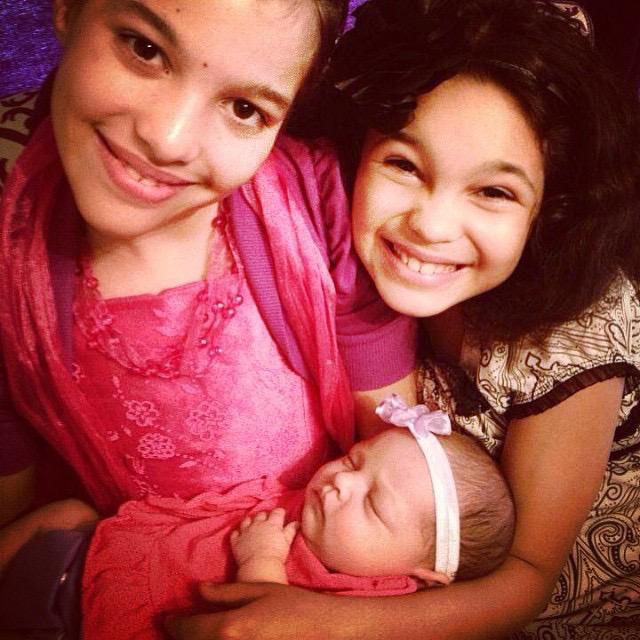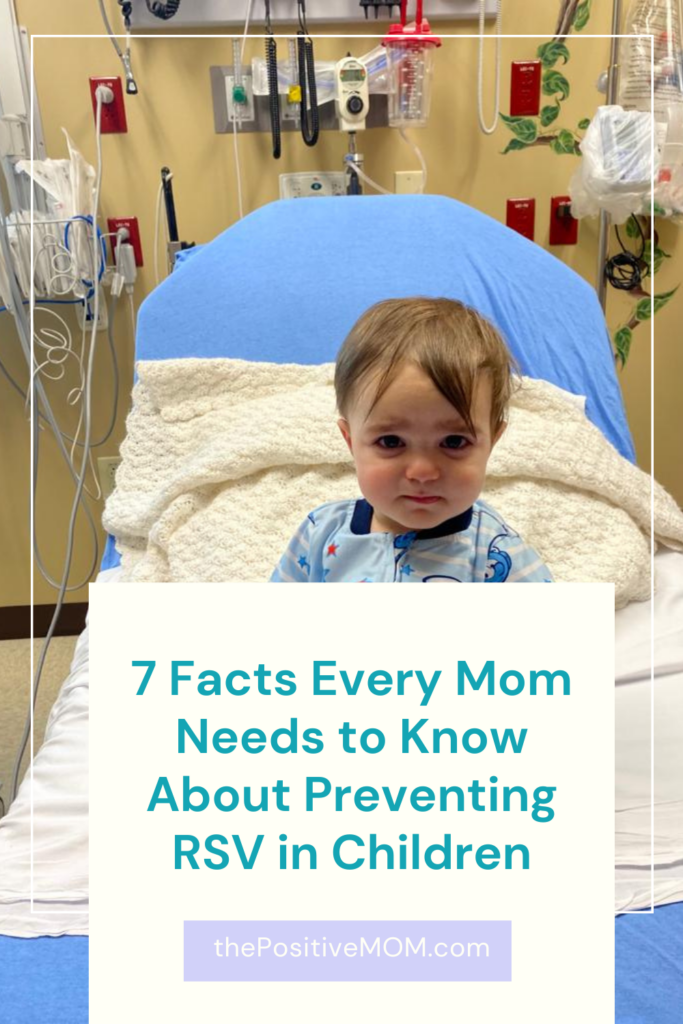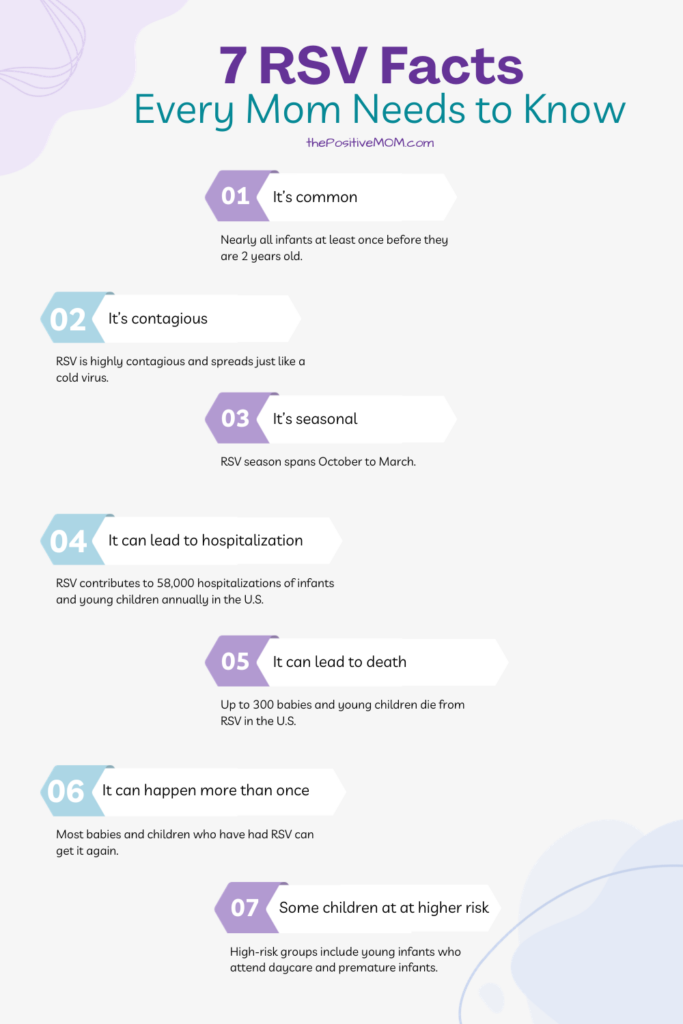
Motherhood is full of unknowns and we all do the best we can to deal with the curve balls that are often thrown at us. Yeah, that was a baseball reference – I am Dominican, after all.
But I’m serious though. We don’t know what we don’t know and when our child is not feeling well, we question everything we know… and everything we feel.

When Eliana was born, Elisha was 11, and Elyssa was 10, so I was already feeling like a seasoned mom. I was past 35 and considered an elderly mom by many, after all. But when I took her to the emergency room, and she was diagnosed with RSV, I was clueless.
I thought I was familiar with the common wave of viruses that come with the Fall and Winter seasons, but I had never heard of RSV!
What is RSV?
And what does RSV stand for?
Is she going to be okay?
My sense of inadequacy was only overpowered by my worry about Eliana. She was only a few months old, and she had been such a healthy baby!
What is RSV?
How much do you know about RSV? If you have never heard of RSV, you are not alone!
Respiratory Syncytial Virus (RSV) is a highly contagious seasonal virus that can lead to serious respiratory illness in infants.
7 Facts about RSV: A Mom’s Need-to-Know Guide
When I found out about RSV, I definitely beat myself up about not knowing much about this viral illness, and I wondered if I could have done something to prevent it.
These days, I choose to give myself some grace and not only to educate myself about viral infections and respiratory viruses but to share my story to spread a good thing: awareness. That’s why I’m partnering with March of Dimes to encourage pregnant people and those with infants to follow standard precautions to lower the baby’s risk of RSV.

So let’s start with some facts everyone needs to know about RSV:
RSV Fact #1
Almost all children get RSV. RSV is contracted by nearly all infants at least once before they are 2 years old. RSV can be more serious in babies younger than 6 months of age.
RSV Fact #2
RSV is highly contagious. RSV spreads just like a cold virus: from person to person. RSV enters the body through the nose or eyes, usually from contact with infected saliva, mucus, or nasal discharge.
RSV Fact #3
RSV usually occurs in the late fall through early spring months but the time of year can vary depending on your location. Be on the lookout for RSV from October to March, just like the cold season and the flu season.
RSV Fact #4
RSV contributes to more than 58,000 hospitalizations of infants and young children annually.
RSV Fact #5
Up to 300 babies and young children die from RSV in the U.S. each year.
RSV Fact #6
Most babies and children who have had RSV can get it again.
RSV Fact #7
Very young infants who attend daycare, especially premature infants, are at high risk of getting severe RSV. This is also true of children who have a chronic illness, asthma, lung problems, heart problems, or a weak immune system.
I feel blessed that Eliana is a healthy 10-year-old now and that she overcame RSV.
It was a frightening hospitalization.
I called my child’s doctor because Eliana was having cold-like symptoms. At first, they said it was allergy season and to keep monitoring her. I didn’t think these were symptoms of allergies and she had a high fever, so I called again. I was afraid of being “a pest,” but I got over it.
They said to buy over-the-counter medication that would probably take care of it.
But something was telling me there was more…
The fever would not go away, even with acetaminophen and ibuprofen. Maybe it was an ear infection? I ruled that out when she started to wheeze and struggle to breathe. So even though it was the middle of the night, I started searching for urgent care centers for babies in my neighborhood.
These things never happen when it’s convenient. It doesn’t make sense logistically or financially, especially when there’s no health insurance, and you’re barely surviving and making ends meet. I certainly can relate to that.
What are the warning signs and symptoms of RSV?
While it’s true that RSV can present similar symptoms to the common cold virus there are some unique signs of RSV. Let’s take a look at the common symptoms of RSV:
- Cough
- High fever, especially for infants three months of age or younger
- Irritability
- Runny nose or stuffy nose
- Sneezing
- Sluggishness or inactive
- Trouble breathing/shortness of breath (you can notice difficulty breathing by observing the baby’s rib cage)
- Wheezing
- Significant decrease in appetite, activity, or alertness
- Symptoms that don’t improve after seven days
- Dehydration (in infants, fewer than one diaper every eight hours)
- Pauses in breathing
- Gray or blue color in the skin, lips, or tongue
I am grateful I followed my intuition and came in soon after Eliana started showing RSV symptoms. Through a physical exam and testing of her mucus, they diagnosed her with RSV.
It’s important to consult our baby’s pediatrician or healthcare provider when something seems or feels wrong. As they say, it’s better to be safe than sorry.
We weren’t exactly safe, but her treatment wasn’t as aggressive as it could have been. We avoided severe illness (a more serious RSV infection), and her hospital stay wasn’t as long as many other children. She had to do breathing treatments and they were able to reduce her high fever. Most children are intubated, and treated with oxygen or a ventilator, and severe RSV disease leads to bronchiolitis (lower respiratory tract infection) or pneumonia, and infectious diseases.
How to help protect a baby from RSV
Researchers have worked to develop a RSV immunization, which gives us hope.
While we wait for these RSV immunizations to be available, here are some ways to prevent the spread of RSV and protect our little ones from it:
- The best way to keep children safe is to stay up to date on their vaccines. When adults get their annual shot, they have safer exposure to children. For example, I got the flu shot when I was pregnant with my fourth daughter Elydia. A new shot for preventing RSV has also been approved.
- Avoid close or direct contact with people with possible RSV symptoms, cold symptoms, symptoms of COVID-19, and symptoms of flu ( including sneezing, dry cough, sore throat, and nasal congestion)
- Cover your cough and sneezes
- Practice frequent handwashing with soap and water for at least 20 seconds
- Make sure no one holds your baby without washing their hands first
- Avoid touching faces with unwashed hands
- Disinfect the baby’s toys often
- Clean and disinfect hard surfaces in the home often (such as doorknobs and table tops, where the virus can live for days)
- Avoid sharing cups, utensils, and food with the baby
- Limit the time children spend with crowds and people outside of the immediate family, especially during periods of high RSV activity and during the first few months of life
- The virus can live on hard surfaces such as doorknobs and tabletops for days
- Keep children home from school or child care when they’re sick, and seek medical attention when necessary
- Don’t allow anyone to smoke near the child. Secondhand smoke can increase the risk of infection and the severity of symptoms
- If you are able and willing, feed your baby breastmilk. Its antibodies help prevent and fight infections.
- Keep your baby hydrated at all times
Do what you can!
I am a single mom. I sometimes work around the clock to provide for my family, so I know this long list can be intimidating. And just like I did when Eliana was diagnosed, we often blame ourselves or look at this list as evidence that it’s maybe our fault and that we could have prevented it.
We all do the best we can to keep our children safe- which is by no means perfect – at least in my case.
So do what you can!
You can do two things:
- If your baby has symptoms – mild symptoms or severe symptoms – make sure to get medical care as soon as possible.
- When the new RSV shots are available in your community, talk to your healthcare providers about getting these immunizations for your baby and yourself, if you are pregnant.
March of Dimes is excited and encouraged by the strides being made to develop immunization solutions that can help keep our babies healthy, by providing immunity from RSV. Click here to learn how to keep your family safe this RSV season: marchofdimes.org/rsv.
As you learn the evidence-based facts about RSV and everything that threatens the well-being of your children, I know you will make the choices that will keep them safe, well, and protected. That’s what you do because you’re a positive mom.
I know it’s easy to berate ourselves and hard to celebrate ourselves, especially when life is challenging. But the way you handle those curveballs and stay in the game deserves to be celebrated. You deserve to be celebrated.
How will you keep RSV at bay? Share in the comments below!
Founder of the Positive MOM® and creator of the S.T.O.R.Y. System: a blueprint to craft and share powerful stories that will transform your results and help others do the same. Dr. Elayna Fernández is a single mom of 4, an award-winning Storyteller, Story Strategist, and Student of Pain. She’s a bestselling author, internationally acclaimed keynote speaker, and 5x TEDx speaker. She has spoken at the United Nations, received the President’s Volunteer Lifetime Achievement Award, and was selected as one of the Top Impactful Leaders and a Woman of Influence by SUCCESS Magazine. Connect with Elayna at thepositivemom.com/ef and follow @thepositivemom. To receive a gift from Elayna, click HERE.

Want to support the Positive MOM blog?
The mission of the Positive MOM blog is to help moms break trauma cycles, find peace, and feel emotionally whole, so they can practice supportive parenting and create a positive and healthy environment for their children. If you found Elayna’s content valuable, please consider donating a love offering to enable her to keep creating content and helping more moms worldwide. Donate HERE.

